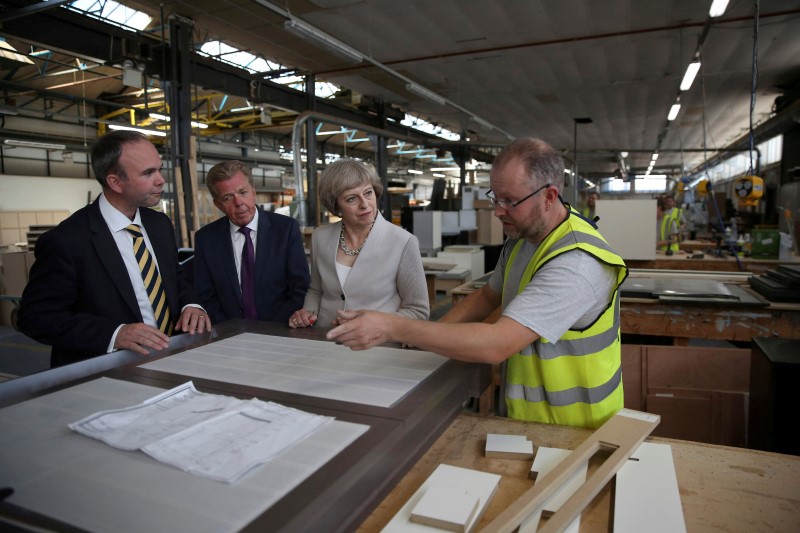By David Milliken
LONDON (Reuters) - British manufacturing staged one of its sharpest rebounds on record in August as factories recovered from the initial shock of June's vote to leave the European Union, helped by a boost to exports from sterling's post-Brexit slump.
The Markit/CIPS Purchasing Managers' Index (PMI) - a closely watched gauge of factory activity - jumped to a 10-month high of 53.3 in August after tumbling to a three-year low in July after the referendum, which was revised up to 48.3 from 48.2.
The five-point monthly surge was the joint-largest in the manufacturing survey's near 25-year history and far outstripped all forecasts in a Reuters poll of economists. But it also underscored how the weaker currency is likely to fuel inflation.
Data over the past couple of weeks have shown consumer demand held up in the face of the referendum result and Thursday's survey suggests manufacturing, which accounts for 10 percent of Britain's economy, is weathering the initial impact of the vote better than feared.
Sterling soared more than a cent against the dollar and British government bond prices fell to a one-month low after the data.
"Clearly there is a storming recovery in the headline index," Investec economist Chris Hare said. "We would expect manufacturing exports to fare well post-Brexit because they have the benefit to gain from falling sterling, but the surprise is that domestic business picked up too."
Markit, which compiled the PMI said, companies had reported restarting work which they had put on hold in July, as their clients saw business starting to return to normal.
"The domestic market showed a marked recovery, especially for consumer products, while the recent depreciation of sterling drove higher inflows of new business," Markit economist Rob Dobson said.
However the EEF trade body, which represents manufacturers, said the strength may not be sustained.
"Manufacturers ... appear to have their mojo back in August," EEF chief economist Lee Hopley said. "But the heightened volatility in the indicator in the last couple of months still raises questions about whether sentiment has overshot somewhat and ... some moderation is likely."
LONGER-TERM HIT?
After Britons unexpectedly voted to leave the EU sterling fell by more than 10 percent against the dollar and the euro, losses that have not been recouped as markets bet on a long-term hit to British economic performance and that the Bank of England will lower interest rates again later this year.
Economists will be keen to see if the rebound in manufacturing PMI is also reflected in figures due to be published on Monday for the far larger, more domestically focused services sector.
The weak PMI surveys of July suggested the economy had begun to contract at the fastest rate since the 2008-09 financial crisis and were a big factor behind the BoE's decision on Aug. 4 to cut rates to a record low and restart bond purchases.
August's manufacturing PMI showed export orders flowed in at their fastest rate since June 2014, though overall order growth was below June's rapid pace. Factories reported that they increased output by the highest amount since January.
A separate survey published last week by the Confederation of British Industry showed export orders rising at the fastest rate in two years in the first part of August, but more subdued domestic demand than the PMI.
In the longer run, Britain's access to European export markets remains uncertain. Prime Minister Theresa May's new government has not said when it will start formal talks to leave the EU and has given no detail on whether it would allow unlimited EU migration in return for continued easy trade access - a likely demand of other countries in the bloc.
The flip side of the short-run boost to exports from a weaker currency are signs of rising inflation pressure.
Manufacturers taking part in the PMI survey reported the biggest rise in input costs in more than five years, and said they were also raising the prices they charged customers at the sharpest rate since mid-2011.

The BoE expects higher inflation and lower living standards to be one of the main costs for households from the vote to leave the EU, outweighing gains to trade from a weaker currency.